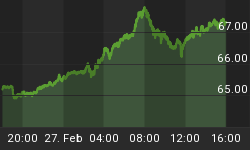Citigroup’s Economic Surprise Index just hit its lowest level since August 2011. But this level of disappointment has ironically emboldened the Fed to step up its hawkish monetary rhetoric. The truth is that the hard economic data is grossly missing analyst estimates to the downside as the economy inexorably grinds towards recession. This anemic growth and inflation data should have been sufficient to stay the Fed's hand for the rest of this year and cause it to forgo the unwinding of its balance sheet.
But that's not what’s happening. Ms. Yellen and Co. are threatening at least one more rate hike and to start selling what will end up to be around $2 trillion worth of MBS and Treasuries before the end of the year--starting at $10 billion each month and slowly growing to a maximum of $60 billion per month.
But why is the Fed suddenly in such a rush to normalize interest rates and its balance sheet? Perhaps it is because Ms. Yellen wants to fire Trump before she hears his favorite mantra, “you’re fired,” when her term expires in early 2018. It isn’t a coincidence that these Keynesian liberals at the Fed started to ignore the weak data concurrently with the election of the new President.
A Q1 GDP print of just 1.4% has not dissuaded the FOMC from a hawkish stance. And a lack of evidence for a Q2 rebound in the data hasn’t done so either. April housing data was very weak: New home sales in the single family category were down 11.4%, existing home sales were also down 2.5%. And even though there was a small bounce back in housing data in May, Pending Home Sales have fallen three months in a row and were down 0.8% in May. Retail sales dropped, 0.3% and durable goods declined 1.1% during May; while the key metric for business productivity, core capital goods orders, fell 0.2%.
It’s not just economic growth indicators that are disappointing, but also evidence of disinflation abound everywhere. Measures of Consumer Price Inflation and the Personal Consumption Expenditure price indexes are falling further away from Fed's 2% target. Commodity prices are also illustrating signs of deflation. The CRB Index is down 14% so far this year and WTI crude oil is in a bear market. Further evidence of deflation is seen in the fact that the spread between long and short-term Treasury Yields are contracting. There has been a six-month decline in C&I loan growth and the household survey within the Non-farm Payroll report turned negative in May. The Household Survey is a leading indicator for the Establishment Survey and the overall employment condition.
Wall Street’s currently favorite narrative is one of strong earnings growth. But according to FactSet, nearly half of Q2's projected 6.5% EPS growth is from energy. Excluding this sector, EPS growth is projected to be just 3.6%. The projected average price of WTI crude for Q3 is $54.29. With the oil price now hovering around $43 per barrel, the hoped-for boost to EPS growth from energy will turn into a big drag unless crude turns around quickly.
The economy should continue to move further away from the Fed’s growth, and inflation targets as its previous monetary tightening starts to bite. But one last nail in the coffin for Fed hawks will be an NFP report sub 50K. The odds are very high that such a weak print on jobs will occur before the next hiking opportunity on Sept. 20th. In addition, if the S&P falls more than 15% from its high the turn in Fed policy from hawkish to dovish is virtually assured. From there it will turn to panic as the economy and stock market meltdown.
I say meltdown because, at 25x reported earnings, the S&P 500 is the 2nd most expensive in history. But this particular overvalued market exists in the context of a weak and slowing economy; coupled with a tightening monetary policy that has been in place since the Fed started to reduce the amount of its $85 billion per month worth of bond purchases back in Dec 2013. And, most importantly, the coming market crash and recession will occur with the balance sheets of the Treasury and Fed already extremely stretched. Hence, an extrication from this recession will not happen quickly or easily.
All of the above makes this the most dangerous market ever. This crash and ensuing economic downturn, which given history, logic and the data should happen soon; will alter the Fed's current stance on monetary policy. But it will happen too late to preclude a very steep decline in GDP.
Therefore, if Mr. Trump cannot push through his tax cutting agenda rather quickly it may be both Ms. Yellen and the Republicans that find themselves moving out of D.C. in 2018; and move the Donald back to the Apprentice after just one term.
By Michael Pento















